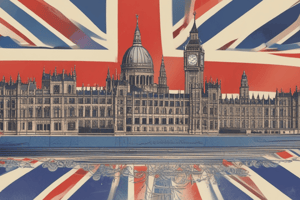Podcast
Questions and Answers
What does the principle of parliamentary sovereignty imply in the UK?
What does the principle of parliamentary sovereignty imply in the UK?
- Judicial review is a fundamental part of parliamentary sovereignty.
- Parliament cannot be overruled by other governmental bodies. (correct)
- Parliament's power is limited by regional governments.
- Parliament has equal power with the monarchy.
What are the two important recent changes to Britain's democratic regime?
What are the two important recent changes to Britain's democratic regime?
- Formation of political parties and the introduction of the constitution.
- The introduction of a federal system and creation of regional governments.
- Creation of the Magna Carta and establishment of the monarchy.
- Devolution of power and establishment of an independent supreme court. (correct)
What distinguishes a unitary system with devolution from a federal system?
What distinguishes a unitary system with devolution from a federal system?
- In unitary systems, national governments can reclaim devolved powers. (correct)
- Federal systems centralize power more effectively than unitary systems.
- Federal systems do not allow for regional governments to exist.
- Unitary systems give regional power constitutional protection.
What was the role of law lords before the creation of the Supreme Court in 2005?
What was the role of law lords before the creation of the Supreme Court in 2005?
How does the Supreme Court in the UK protect citizens' rights?
How does the Supreme Court in the UK protect citizens' rights?
Which of the following best describes devolution in Scotland and Wales?
Which of the following best describes devolution in Scotland and Wales?
What was a significant issue in Northern Ireland regarding its relationship with the UK?
What was a significant issue in Northern Ireland regarding its relationship with the UK?
What characteristic of judicial power does the Supreme Court lack in the UK?
What characteristic of judicial power does the Supreme Court lack in the UK?
What authority was established for the northern ireland assembly after the 1998 agreement?
What authority was established for the northern ireland assembly after the 1998 agreement?
What was the outcome of the 2014 Scottish independence referendum?
What was the outcome of the 2014 Scottish independence referendum?
What percentage of Scottish voters supported remaining in the EU during the 2016 Brexit referendum?
What percentage of Scottish voters supported remaining in the EU during the 2016 Brexit referendum?
What event in 2016 prompted a significant political shift in the UK regarding EU membership?
What event in 2016 prompted a significant political shift in the UK regarding EU membership?
What major political consequence followed the 2016 Brexit referendum?
What major political consequence followed the 2016 Brexit referendum?
Which issue contributed to the division over Brexit among voters?
Which issue contributed to the division over Brexit among voters?
What was a major outcome of Boris Johnson's negotiations regarding Brexit?
What was a major outcome of Boris Johnson's negotiations regarding Brexit?
How did Brexit impact the UK’s political system?
How did Brexit impact the UK’s political system?
Flashcards are hidden until you start studying
Study Notes
UK Constitution
- The UK constitution is comprised of documents like the Magna Carta, laws passed by Parliament, and unwritten traditions.
- Parliamentary sovereignty is the principle that Parliament’s power is supreme.
- Civil rights and liberties are protected, as they have existed for a long time.
Recent Changes to UK Democracy
- Devolution of power from the central government to regional governments.
- Creation of the Independent Supreme Court in 2005.
- Supreme Court can overturn executive and administrative actions that violate citizens’ rights.
Unitary System with Devolution
- The UK has a unitary system where all power is held by the national government.
- In 1997, the British Parliament devolved some policy areas to Scotland and Wales.
- Northern Ireland gained devolved powers in 1998.
- The Scottish National Party seeks Scottish independence.
- Scotland held a referendum on independence in 2014, which failed.
- Brexit strengthened the independence movement.
Legitimacy and Challenges to the State
- The UK held a referendum on continued membership in the EU in 1975, and voted to remain.
- In 2016, the UK held a referendum on leaving the EU, and voted to leave.
- The Brexit referendum led to the resignation of Prime Minister David Cameron.
- Brexit challenges Britain’s political system and the possible secession of Scotland.
- The UK left the EU in 2020.
- Immigration policy is a divisive issue in the UK.
Studying That Suits You
Use AI to generate personalized quizzes and flashcards to suit your learning preferences.




